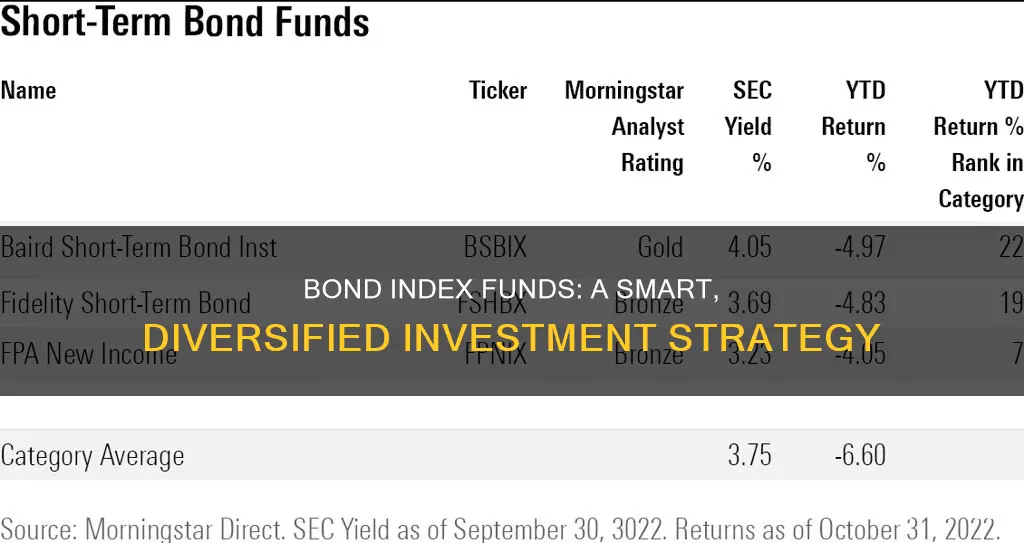
Investing in bond index funds is an appealing option for those looking to diversify their portfolio and reduce risk. Bond index funds are a type of mutual fund or exchange-traded fund (ETF) that invests in a selection of bonds, aiming to reflect the performance of a specific bond index. They provide investors with access to a diversified portfolio of bonds from various issuers, maturities, and credit ratings. This diversification helps to lower the risk of loss, as the impact of any single bond's performance is reduced. Additionally, bond index funds offer professional management, liquidity, and the potential for tax-free income. However, it's important to consider the downsides, such as volatility due to rate changes and potentially lower performance compared to other fund-based investments. Ultimately, the decision to invest in bond index funds depends on individual financial goals, risk tolerance, and behavioural preferences.
| Characteristics | Values |
|---|---|
| Purpose | To reflect the performance of a particular index |
| Type of investment | Diversified, low-fee |
| Form | Passive investing |
| Management | Less management and operating costs |
| Interest payments | Monthly |
| Volatility | Long-term |
| Risk | Lower performance than other fund-based investments |
| Income | Steady stream of income |
| Safety | Safer investments generate smaller returns in the long term |
| Maturity | No maturity date for the repayment of principal |
| Investor control | Cannot control the buying and selling of individual bonds |
| Tax | Harder to plan for from a tax standpoint |
| Returns | Lower returns |
What You'll Learn

Lower fees
One of the key benefits of investing in bond index funds is lower fees. Bond index funds are a form of passive investing, meaning they aim to mimic the performance of the bond market rather than seeking to outperform it. This passive approach requires a smaller degree of management and results in lower operating costs, which can be passed on to investors in the form of lower fees.
Actively managed funds, on the other hand, involve fund managers carefully selecting securities with the aim of beating the index. This approach requires a lot more management, which could result in higher fees. These fees can significantly reduce an investor's returns, especially in a low-yield interest rate environment.
Additionally, bond index funds provide access to institutional pricing, which is typically lower than the pricing individual investors receive. This means that for the same investment, an investor in a bond index fund may pay a lower price and thus achieve a higher yield.
Furthermore, bond index funds have a lower minimum investment requirement compared to purchasing individual bonds. This makes it more accessible for investors to achieve a diversified bond portfolio with a smaller amount of capital.
Finally, bond index funds also offer the advantage of professional management. Fund managers in charge of bond index funds have the expertise to research and analyse the creditworthiness of bond issuers and market conditions, making informed decisions about buying and selling bonds within the fund. This level of professional management is beneficial for investors who may not have the time or knowledge to actively manage their bond investments.
Bernie Madoff's Ponzi Scheme: Avoiding Client Fund Investments
You may want to see also

Diversification
By investing in a bond fund, you are buying shares in a fund that holds a large number of bonds with varying maturities, interest rates, coupon rates, credit ratings, and issuers. This diversification across different types of bonds can help to lower your risk because if one bond defaults or underperforms, it will have less impact on the overall value of your investment.
Bond index funds also provide diversification by allowing you to invest in a variety of issuers. In the fixed-income market, there are many sub-asset classes, and it can be difficult and costly for individual investors to achieve adequate diversification across these different classes. Bond funds, on the other hand, provide instant diversification by giving you exposure to a basket of bonds within the fund. This can be especially beneficial if you have a limited amount of money to invest, as you can achieve greater diversification per dollar invested.
Additionally, bond index funds can provide geographic diversification. International index funds, for example, allow investors to diversify their portfolios by investing in securities from emerging or developing economies around the world.
Another benefit of diversification through bond index funds is that it can help to balance out the riskier parts of your portfolio, such as stocks. Bonds are traditionally used to diversify holdings and are seen as a safe haven asset class that can help preserve capital. They have historically acted as a counterbalance to stocks, so including them in your portfolio can help to reduce the risk of all your investments falling at the same time.
Overall, diversification is a significant advantage of bond index funds, as it can help to lower your risk, maximise your returns, and balance out the other parts of your investment portfolio.
Mutual Fund Investing: What You Need to Know
You may want to see also

Professional management
Fund managers may replace bonds when an issuer's credit is downgraded or when the issuer "calls", or pays off the bond, before its maturity date. They can also buy newer bonds with higher coupon rates when interest rates rise, potentially increasing the fund's income payments.
Actively managed funds involve fund managers carefully selecting securities with the aim of beating the index. This requires a lot of management, which could mean higher fees. These fees can take a major chunk out of your return in a low-yield interest rate environment.
On the other hand, bond index funds are a form of passive investing, where the fund aims to mimic the performance of the bond market. This involves a smaller degree of management and operating costs, and these savings can be passed on to investors in the form of lower fees.
Vanguard Index Funds: Best Investment Options for 2023
You may want to see also

Tax-free income
Municipal bond funds are a great way to reduce your tax burden. Municipal bonds are issued by states, cities, counties, or local government entities and are generally not taxed at the federal level. In some cases, they may also be exempt from state and local taxes. This means that interest income generated by municipal bond funds is generally not subject to federal taxes and may be tax-exempt at the state and local levels as well.
Although municipal bond yields are typically lower than taxable bond fund yields, investors in higher tax brackets may find that they have a higher after-tax yield from a tax-free municipal bond fund investment. This is because the after-tax yield from a tax-free municipal bond fund investment may be higher than the after-tax yield from a taxable bond fund investment, where taxes are deducted from the yield.
It is important to note that tax-free investments are usually not appropriate for tax-advantaged accounts such as IRAs. Additionally, some investors may be subject to federal or state income taxes or the Alternative Minimum Tax (AMT) when investing in municipal bonds.
When considering tax-free income, it is crucial to consult with a financial advisor or tax professional to understand the specific tax implications for your situation. They can guide you in determining if investing in municipal bond funds is the right decision for your financial goals and tax circumstances.
Adani's Success: Mutual Funds Investing in the Giant
You may want to see also

Liquidity and convenience
Bond funds, such as mutual funds, pool money from numerous investors to purchase a collection of bonds and other debt securities. They are a more efficient way to invest in bonds than buying individual securities, as they provide greater diversification and professional management for a low minimum investment.
The impact of any single bond's performance is reduced in bond funds because they typically own a number of individual bonds with varying maturities. This diversification also mitigates risks associated with bond investing, such as default risk and call risk.
Bond funds provide investors with regular monthly income, although the amount may vary depending on market conditions. This feature makes bond funds suitable for investors seeking stable and consistent income.
Mutual Funds Backing AMD: Who's Investing in the Tech Giant?
You may want to see also







